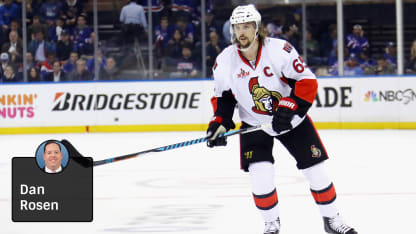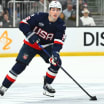PITTSBURGH -- Defenseman Erik Karlsson is being modest about his impact on the Ottawa Senators.
"I do my part, and I do the best that I can up to my ability," the two-time Norris Trophy winner said. "Then you hope everybody else does too."
Erik Karlsson holds key to Senators success
Defenseman is cornerstone of Ottawa's game plan against Penguins in conference final

Except everybody else in the lineup takes their cues from the captain. Ottawa's game plan is predicated on Karlsson doing his part and doing it well.
This is by design, because Karlsson's skill set is tailor-made for coach Guy Boucher's passive 1-3-1 neutral-zone clogging system. It's the biggest reason why the Senators are in the Eastern Conference Final and preparing to play Game 1 against the Pittsburgh Penguins is at PPG Paints Arena on Saturday (7 p.m. ET; NBC, SN, CBC, TVA Sports).
"I definitely looked at what we had, whether it was defensemen or forwards, and I built our identity around him and his strengths," Boucher said of Karlsson.
For all the talk about the sublime plays Karlsson has made during the 2017 Stanley Cup Playoffs -- the big goals; the seemingly impossible passes that led to goals; his 13 points (two goals, 11 assists), most among any defenseman -- it would be wrong to mention them and ignore the system.
The system installed by first-year coach Guy Boucher is built to force or guide the opposition to its left as it tries to come up the ice. That means it's being pushed to Karlsson's strong side. That's not a coincidence.
It's designed to compel the opposition into quick decisions in the neutral zone that create turnovers and allow the Senators to transition the other way. Again, not a coincidence.
"Because [Karlsson] is able to defend and take off, we're a counteract team, a big transition team, and he fits perfectly in that," Boucher said. "I like to accelerate the transition, and there's no better defenseman to transition in the League than Erik Karlsson."
The system is also built to allow Karlsson to be the puck retriever when the opposition dumps it into the zone. The system can break down, as it did at times in the second round against the New York Rangers, who were able to get through with speed or win the battles on the forecheck because they had multiple players steaming into the zone against the one Ottawa player, plenty of times Karlsson.
However, what we've seen in this postseason is that over time, Karlsson and the system will win. His agility, vision, puck-handling skills and smarts help him get the puck out when it goes in.
"He's one of a kind," forward Mark Stone said. "I don't think anybody in the League really does what he does. Sometimes you can take that for granted, but nothing really seems to amaze us when he makes the plays. We just kind of expect it."
But there's more to Karlsson's game this season.
"I can't ask him to defend better," Boucher said.
The knock on Karlsson had always been that he was a star defensemen but not a star defender. Now he's both.
Karlsson finished second in the League in blocked shots during the regular season with 201 in 77 games, an average of 2.6 per game. He has 24 blocks in 12 games in the playoffs (2.0 per game).
He averaged 1.5 blocks per game in the past three seasons.
Karlsson played 2:09 of ice time per game on the penalty kill after averaging 1:07 per game on the penalty kill in the previous three seasons. Ottawa was 79.7 percent on the penalty kill this season; not great, but better than last season, when it was 75.8 percent.
The Senators are 87.5 percent on the penalty kill in the playoffs.
Karlsson's overall ice time still dropped this season to 26:50 per game from an average of 27:46 during the past three seasons. His shifts averaged 51 seconds, nine seconds less than his previous three-season average.
RELATED: [Complete Senators vs. Penguins series coverage]
Boucher said the shorter shifts were by design to have him be fresher in the defensive zone when necessary.
Karlsson is averaging 28:56 per game in the playoffs, but he averages 53 seconds per shift. And that only got bumped up because he played 6:27 of the final 8:24 in Ottawa's series-clinching 4-2 win in Game 6 against the Rangers on Tuesday.
He didn't play the last seven seconds after Ottawa scored an empty-net goal.
"I think that tells you something," general manager Pierre Dorion said. "If you would told a lot of people at the end of last year Erik is going to play over six minutes in the last eight minutes of a one-goal game, I don't think a lot of people would have believed you. But we saw how good he was in those last eight minutes."
If you ask Karlsson, he'd say he was just doing his part. That may be true, but his teammates know it's more than that.
"We have a superstar defenseman that's paving the way for us," Stone said, "and we're really following in those footsteps."

















